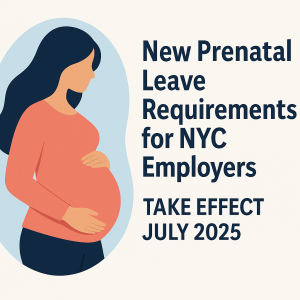Remote Work Denials and Discrimination Claims: What Employers Need to Know in a Post-Pandemic Landscape
4/29/25
As the return to in-office work becomes the norm, employers are facing a new wave of discrimination claims from employees whose requests to work remotely have been denied. While federal courts continue to uphold employer discretion in most cases, the legal landscape in New York—especially under the New York State and City Human Rights Laws—is far more nuanced.
Federal Standards: Denial of Remote Work Not an “Adverse Action”
Recent federal decisions have reaffirmed that, under Title VII and similar federal statutes, a refusal to allow remote work generally does not constitute a legally “adverse employment action.” Courts have ruled consistently that, absent tangible consequences like pay cuts or demotion, the denial of a remote work request is not enough to support a federal discrimination claim.
In Hamilton v. Siemens Healthcare and Jones v. Brookhaven Science Assoc., courts reiterated that unless health or safety risks are involved—as in the unique Gayles v. Roswell Park case from the height of the COVID-19 pandemic—remote work remains a matter of employer discretion under federal law.
New York Laws: Broader Protections and Greater Employer Risk
By contrast, claims brought under the NYCHRL and, increasingly, the amended NYSHRL, are harder to dismiss. These laws do not require the same threshold showing of “materially adverse” treatment. A plaintiff need only show they were treated “less well” than others due to a protected characteristic.
In Thompson v. Shutterstock, for example, the plaintiff failed to state a federal claim but was permitted to proceed under the NYCHRL. The court held that allegations of race-based inconsistency in remote work permissions stated a viable discrimination theory under local law.
Employers should also be aware that offering remote work as a quid pro quo (e.g., in exchange for dropping a complaint) can support a retaliation claim—even under Title VII. A uniform and documented remote work policy, applied consistently, is the best defense against such claims.
Key Takeaways for Employers
- Under federal law, denying a remote work request—on its own—is unlikely to result in liability unless it ties to health, safety, or is offered as retaliation.
- Under New York State and City laws, the same denial may support a discrimination or retaliation claim if based on protected status or inconsistently applied.
- Consistency is key: Employers should ensure their return-to-office decisions are rooted in documented business needs, not perceived or actual bias.
- Train your managers on the legal nuances between federal and local laws, especially when overseeing hybrid or flexible work arrangements.
For help developing compliant remote work policies or defending against discrimination claims, contact Sheryl Galler at sgaller@booklawllp.com or Chaim Book at cbook@booklawllp.com.


